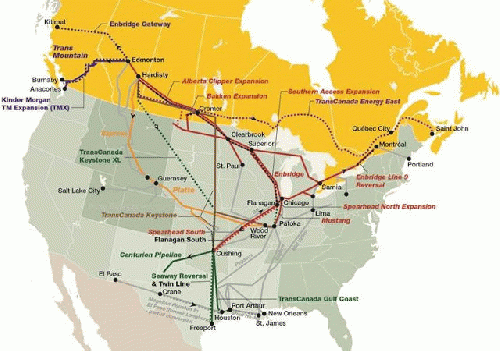
Existing oil pipeline is robust and over-capacity already
(Image by Newxtbigfuture blog) Details DMCA
The rejection of the Keystone Pipeline is a Pyrrhic victory. It won't
stop the oil from being pumped, though record low oil prices might. It
won't prevent oil tanker cars from regularly exploding on miles-long oil
trains, it'll encourage more use of them. It was made after 7 years,
and only when TransCanada wanted to withdraw its bid, and when oil
prices were so low that the small amount of oil supply that would
actually stay in the country, and not just be exported, won't be missed
on either the U.S. or world market.
And maybe most importantly, it
comes just as we granted new access to markets for Iranian oil, while
sanctioning oil-rich Russia for crimes in the Ukraine it didn't commit.
Meanwhile, the biggest sponsor of Jihadist terrorism of all, Saudi
Arabia, is allowed to pump so much oil, it is destroying our domestic
oil companies and undercutting prices so much that our renewable energy
industries will be unable to compete with their cheap crude.
Finally, what does one banned pipeline really mean in a nation of crisscrossing existing pipelines and railways?
It's right to be cynical of this decision, made at this time.
However, the president was right about several things when he said of his decision:
Now, for years, the Keystone Pipeline has occupied what I, frankly, consider an overinflated role in our political discourse. It became a symbol too often used as a campaign cudgel by both parties rather than a serious policy matter. And all of this obscured the fact that this pipeline would neither be a silver bullet for the economy, as was promised by some, nor the express lane to climate disaster proclaimed by others.
To illustrate this, let me briefly comment on some of the reasons why the State Department rejected this pipeline.
First: The pipeline would not make a meaningful long-term contribution to our economy. So if Congress is serious about wanting to create jobs, this was not the way to do it. If they want to do it, what we should be doing is passing a bipartisan infrastructure plan that, in the short term, could create more than 30 times as many jobs per year as the pipeline would, and in the long run would benefit our economy and our workers for decades to come.
Our businesses created 268,000 new jobs last month. They've created 13.5 million new jobs over the past 68 straight months -- the longest streak on record. The unemployment rate fell to 5 percent. This Congress should pass a serious infrastructure plan, and keep those jobs coming. That would make a difference. The pipeline would not have made a serious impact on those numbers and on the American people's prospects for the future.
Second: The pipeline would not lower gas prices for American consumers. In fact, gas prices have already been falling -- steadily....
Third: Shipping dirtier crude oil into our country would not increase America's energy security. What has increased America's energy security is our strategy over the past several years to reduce our reliance on dirty fossil fuels from unstable parts of the world. Three years ago, I set a goal to cut our oil imports in half by 2020. Between producing more oil here at home, and using less oil throughout our economy, we met that goal last year -- five years early. In fact, for the first time in two decades, the United States of America now produces more oil than we buy from other countries.
See more details from this article on Next Big Future: nextbigfuture.com/2015/11/in-2015-us-denies-oil-market-access-to.html





